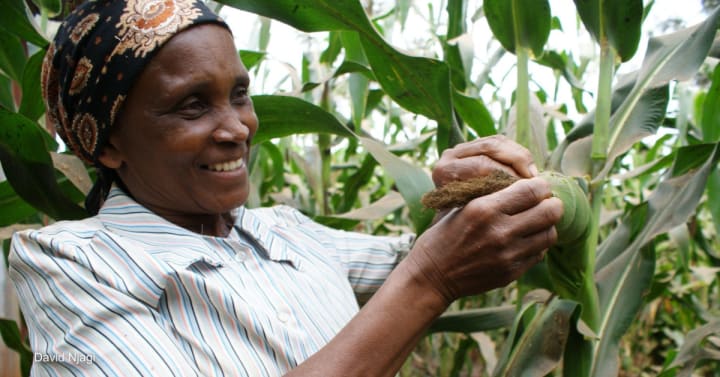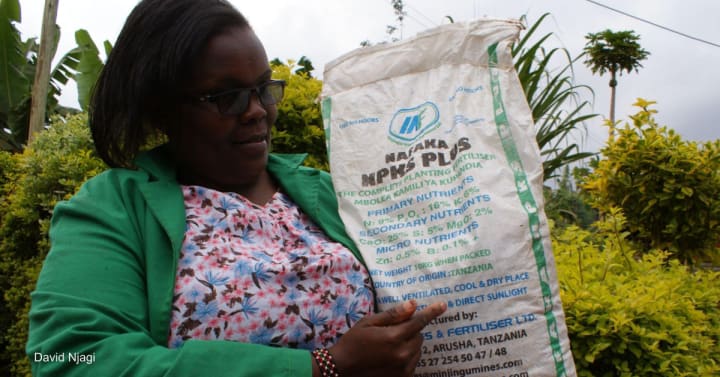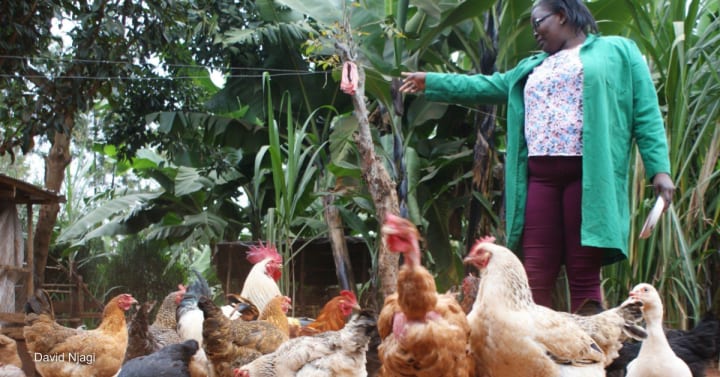News
Village startups battling the fraudulent seed market in Kenya
Farmers in Kenya’s Rift Valley are currently in a standoff with a local seed manufacturer over what the farmers believe were substandard or fraudulent seeds that cost them their harvest. Earlier this year the farmers reported that they had incurred millions in losses due to crop failures.
Though high-quality agricultural inputs such as seeds, fertilizer, and pesticides can boost agricultural productivity, research shows that access to such inputs remains low in rural African markets. In Kenya, only 77% of hybrid maize seeds sold to farmers germinate — far below the 90% germination rate set by the government for the seeds it has certified.
In a bid to improve access to these much-needed inputs, trusted village startups in Kenya, have started to supply smallholder farmers with quality seeds and fertilizers while regional partners are improving surveillance to weed out fake inputs.
“When I started growing the improved seed varieties, I usually get at least five bags of maize harvests even when the rains are inadequate.” — Jacinta Wairimu, a smallholder farmer who buys authentic seeds from a village-based adviser
Authenticating seeds
At a recent webinar, Philip Boahen, the chief agriculture policy economist at the African Development Bank, said a lack of access to quality seeds and fertilizers is one of the leading contributors to low crop yields among smallholder farmers in Africa — after erratic rains.
One of the reasons smallholder farmers are not accessing these inputs is because certified agrochemical companies are finding it difficult to export and import quality seeds and fertilizers due to trade barriers, he said.

Another is that unscrupulous businesses capitalize on these trade restrictions to smuggle fake seeds and fertilizers — mostly packed as grains — which lead to worsening soil degradation and environmental pollution.
Working with the Common Market for Eastern and Southern Africa, however, AfDB is establishing information technology platforms at border points aimed at tracing the trafficking of fake seeds and agrochemicals, Boahen said. The platforms use barcodes to scan products and confirm authenticity with the manufacturer.
“The bank is providing financial and technical support for this project so that we can be able to verify the authenticity of seeds and agrochemicals moving across borders before they reach the destination markets and farmers,” he said.
Village startups intervening
In rural Kenya, suspicious agro-dealers have thrived selling fake seeds and fertilizers, due to the lack of a traceability system and field extension services aimed at educating smallholder farmers on proper seeds and chemical application.
According to a report by the Alliance for a Green Revolution in Africa, smallholder farmers in Africa hardly receive agriculture extension services from their governments, and in most countries, a single extension officer is assigned to serve about 5,000 farmers.
Some village startups are however changing this, by supplying smallholder farmers with quality seeds and fertilizers, as well as providing field extension services to the majority who lack formal education.
Elizabeth Ng’endo, a farmer and village-based adviser in central Kenya, has been supplying seeds and fertilizer to more than 400 farmers from her home.Get development’s most important headlines in your inbox every day.
“Rains have been failing in the past few years leaving us with no harvests. But when I started growing the improved seed varieties, I usually get at least five bags of maize harvests even when the rains are inadequate,” says Jacinta Wairimu, one of Ng’endo’s customers.
Ng’endo sources her inputs from leading agro-dealers in Kenya, where she buys the products at wholesale price.

She then retails to farmers at 85 Kenyan shillings (about $0.85) for a kilogram of fertilizer and 530 Kenyan shillings (about $ 5.30) for a two-kilogram bag of maize seeds.
“People trust me because I live with them. When I sell to them, I usually accompany them at their farms to show them how to plant and apply fertilizer,” says Ng’endo.
The Village-Based Advisor innovation was introduced to her by the Local Development Research Institute and AGRA, working in partnership with the county government of Kiambu in central Kenya.
According to Qureish Noordin, the program officer at AGRA, like Ng’endo, there are 1,464 VBAs in Kiambu and Embu counties where the project is being rolled out and whose training has seen about 255,500 farmers increase crop productivity by 100%.
“It is extension work but not the usual way that it used to be delivered because it is a farmer in the community who works with fellow farmers and teaches them,” says Thule Lenneiye, the coordinator of the agriculture transformation office at the Ministry of Agriculture, Livestock, Fisheries and Co-operatives.
The VBA model is transforming the traditional way of farming to modern ways through innovations that give the farmer a place in the agribusiness space, she added.
Though village startups like Ng’endo’s have an edge in the agribusiness space through the VBA model, Ng’endo warned that serving the ever-growing number of farmers who now rely on her for inputs and agricultural information has become a challenge.

In some instances, she is forced to travel long distances to serve farmers who reach out to her through phone calls, adding a transportation overhead to her daily planner.
In response to this need, Noordin said the VBA program is being scaled up to 14 other counties in Kenya. Ng’endo has also made plans to open an Agrovet shop to ensure that she can meet the demands of farmers in her county.
“I am planning to open an agro vet shop at a convenient location where all farmers can reach me and where my family will have less risk of making contact with the chemicals,” she said.